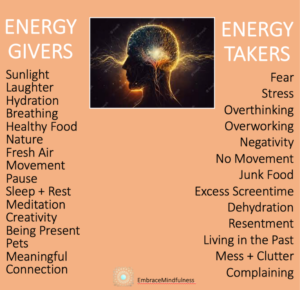 When it comes to energy levels, there are certain things that give us energy and others that sap our energy.
When it comes to energy levels, there are certain things that give us energy and others that sap our energy.
On the positive side, energy givers like healthy eating, exercise, socializing, good thoughts, gratitude and proper sleep. Foods high in nutrients and lower in processed sugar provide long-lasting energy. Regular physical activity can improve mood, sleep quality, and overall vitality. Connecting with others through meaningful conversations and activities energizes us and gives us a sense of purpose. Getting enough high-quality sleep helps our bodies recharge and restore.
On the flip side, energy takers involve unhealthy habits, stress, and negative thinking patterns. Eating processed or fast foods can leave us feeling sluggish and unfocused. Excessive screen time and sedentary behavior zap motivation. Constant stress and worrying deplete our mental and physical reserves. Negative self-talk and focusing on problems more than solutions can weigh us down.
To optimize our energy levels, it’s important to identify the things in our daily routine that give versus take away energy.
We can then make adjustments to incorporate more energy givers and reduce or eliminate energy takers. Even small changes like preparing healthier meals, scheduling more time for movement, reaching out to friends, setting boundaries to minimize stress, and practicing gratitude can make a big difference over time. Making energy management a priority can help us live life with more joy, vitality and zest.
Energy Givers vs Energy Takers in Relationships
When it comes to relationships, some people are energy givers while others are energy takers. Energy givers tend to be positive, uplifting people who enjoy helping and supporting others. They tend to have high emotional intelligence and are good listeners. Energy givers thrive on seeing others happy and tend to give of their time, advice, and resources freely. However, they can sometimes give too much of themselves and fail to set boundaries, leading to burnout.
In contrast, energy takers tend to focus more on themselves and what others can do for them. They often seek attention and validation from others. While everyone needs support at times, energy takers tend to take more than they give in relationships. They can unintentionally drain the energy of people around them through constant complaining, negativity, and excessive demands. Energy takers may not realize the impact of their behavior and think they are being honest and direct.
A healthy relationship involves a balance where both parties are giving and taking in equal measure. Energy givers need to recognize their own needs and set boundaries to avoid depletion.
Energy takers need to develop self-awareness of their impact on others and consciously give more through acts of kindness, listening, and showing appreciation.
When energy givers and takers come together, communication is key to ensure both parties feel valued and supported in the relationship. With understanding and compromise, energy givers and takers can learn to meet each other’s needs in a sustainable way.
Excellent !!!! Sooo real ! Thanks Monica , you always help me a lot , you are a wise woman eager to help others , 🙏🏻
Claudia, Thank you so much for your generous and kind words. I’m so happy to see you found my offerings beneficial.
Thank you for this list. This is so helpful.
So glad you found it useful!!